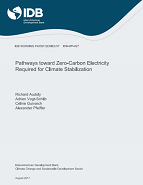Pathways toward Zero-Carbon Electricity Required for Climate Stabilization
Date
Aug 2017
This paper covers three policy-relevant aspects of the carbon content of electricity that are well established among integrated assessment models but under-discussed in the policy debate. First, climate stabilization at any level from 2◦C to 3◦C requires electricity to be almost carbon-free before the end of the century. As such, the question for policy makers is not whether to decarbonize electricity but when to do it. Second, decarbonization of electricity is still possible and required if some of the key zero-carbon technologies — such as nuclear power or carbon capture and storage — turn out to be unavailable. Third, progressive decarbonization of electricity is part of every country’s cost-effective means of contributing to climate stabilization. In addition, this paper provides cost-effective pathways of the carbon content of electricity — extracted from the results of AMPERE, a recent integrated assessment model comparison study, and the IPCC AR5 database. These pathways can be used to benchmark existing decarbonization targets, such as those set by the European Energy Roadmap or the Clean Power Plan in the United States, or inform new policies in other countries. These pathways can also be used to assess the desirable uptake rates of electric and plug-in hybrid vehicles, electric stoves and heat pumps, industrial electric furnaces, or other electrification technologies.



